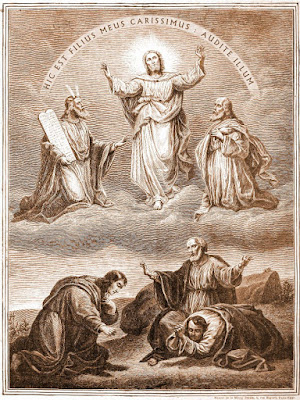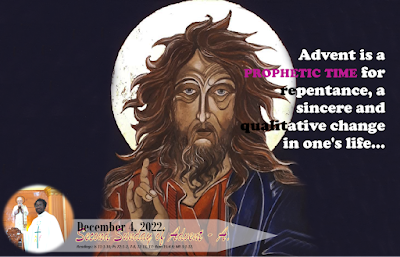WHEN THE FATHER REVEALS THE SON.
Thursday, August 6, 2020
Feast of the Transfiguration of the Lord – A.
A Filipino proverb says, “There’s no glory without
sacrifice.” And an Amerindian proverb adds, “What reveals itself to me ceases
to be mysterious for me alone if I unveil it to anyone else.”
One beautiful element to ponder about on the Feast of the
Transfiguration of the Lord is the Theophany. It is wonderful for us to hear
God’s voice and to see Jesus’ glory be manifest. Thus, this feast takes on the
colors of a Theophany and a Christophany as well. For in order to manifest the
Son, the Father makes himself an obligation to manifest himself, to speak to
human beings. The Son of God who was from of old hidden under the questionable
identity leading to many qualms, even among his close followers, is today fully
revealed and the Father is as well revealed. God reveals himself to men. To say
it better, the Father reveals his Son to our humanity. Christ Jesus is revealed
to his disciples in all his glory, and the Law and the Prophets are brought to
attest of his divine identity. Today, the power and glory of Jesus shine on us.
The voice of the Father recommends us what we should do: “listen to him.” From
today, the identity of the Lord Jesus will no longer be a mystery for his
disciples, and his mission is made manifest to them.
We are celebrating, one of the four festivities where Jesus’
identity is fully revealed and his glory made manifest. The first was the Nativity.
At the Nativity, the Lord was revealed by the Angels to the shepherds and by a
star to the Magi. The second was the Baptism of the Lord. There, the identity
and the glory of the Lord were revealed by the voice from heaven and the Holy
Spirit, and John was the main witness of that event. Then the other revelation,
not so much wordily but more efficient is the Resurrection where the Lord is
manifested to mankind as the Lord of life. And today’s feast, which
chronologically comes before the Resurrection. At the Transfiguration, once
again, as it was done at the Baptism, the voice of the Father is heard and
Jesus’ identity is made clear to his disciples Peter, James, and John. Moses
and Elijah come to seal that revelation and raise high his glory above the Law
and the Prophets. Jesus is shown as the perfect fulfillment of these two and
the instrument of a new covenant.
As the Lord’s power shines on us, we are called to let
ourselves be illuminated and transformed by his brilliance. The Transfiguration
of the Lord in that sense becomes a transformation for us his followers. God is
made transparent into human reality. His glory fully transpires and overshadows
our humanity and leads us to his discovery. This transparence of the Lord into
our humanity raises high in us the desire for holiness and the need for purity.
While Jesus gives his followers a glimpse of His glory, we are called to
holiness, and to ultimately live in glory in heaven.
The Word of God, in today’s liturgy, put a very special
accent on glorification and our sonship by adoption. The first reading speaks
of glory. Daniel’s prophecy describes the Son of Man being enthroned in his
glory, with kingship and dominion over all the nations and all creation. Of
him, Daniel says, “His dominion is an everlasting dominion that shall not be
taken away, his kingship shall not be destroyed.”
For us Christians, Jesus is that Son of Man seated in glory.
He begins a new kingdom, a new covenant. The Gospel, through the episode of the
Tabor, shows us the amazing way God revealed and established that kingdom. The
kingdom of Christ is a kingdom of self-giving. His throne is the cross and his
crown, the thorns. That is the message the transfiguration brings about. That
is what the two interlocutors of the Lord converse about with him. The Law and
the prophets confirm that the true manifestation of Jesus in all his glory will
be on the cross, through his self-sacrifice for all.
The Psalmist cannot do other than to invite us to sing, “The
Lord is king, the Most High over all the earth.” The Lord Jesus, brothers and
sisters, is king. Hanged on the top of the Cross, and crowned with thorns, he
reigns over all the earth.
Peter, however, tells us that the kingship of the Lord is
not a myth neither a creation of human fantasy. It is something he and his
companions have witnessed. Though it was hard for them to understand at the
beginning, they got to see it in all its manifestation. He can, therefore, say
with firmness, “We ourselves heard this voice come from heaven while we were
with him on the holy mountain.” Peter refers to the episode of the
transfiguration. It is an event that has marked decisively the faith and the
life of the disciples, starting with the three ocular witnesses. Before that
event, Peter, even though he confessed Jesus as the Messiah, could not accept
the coming passion and death. The passage before the transfiguration was about
Peter’s confession of Jesus, immediately followed by the first prediction of
the passion and the Lord rebuking Peter. Then to all the disciples, the Lord
sets the conditions of discipleship. In that sense, the transfiguration could
be seen as a culminating catechesis. The Lord manifests himself in all his
glory so that his disciple should know him and follow him till the sacrifice of
themselves for his name's sake.





Comments
Post a Comment